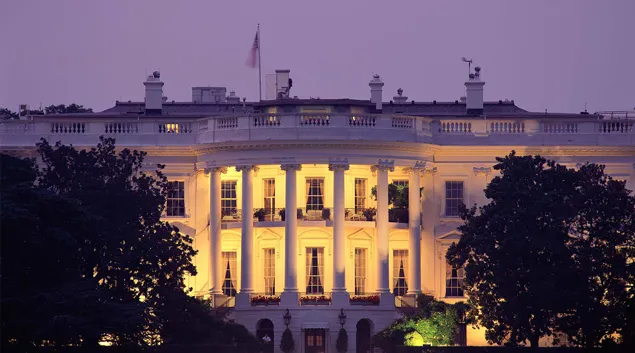
Photo: Walter Bibikow/Getty Images
President Donald Trump signed an executive order Monday that would effectively link drug prices in the U.S. to the cost of drugs abroad, and tasks Department of Health and Human Services Secretary Robert F. Kennedy Jr. to negotiate new prices for the drugs over the next month.
If deals are not reached with the drugmakers, Kennedy will develop a new rule tying the price the U.S. pays for medications to the prices paid by other countries, which are typically lower, in a move the administration is labeling its "most favored nation" policy.
In a Truth Social post, Trump said the executive order would reduce drug prices between 30% to 80% "almost immediately," and then later posted that prices would be reduced by 59%.
The executive order directs the U.S. Trade Representative and Secretary of Commerce to take action to ensure foreign countries are not engaged in practices that purposefully and unfairly undercut market prices and drive price hikes in the U.S., though it's unclear from the order what action would be taken.
It also instructs the administration to communicate price targets to pharmaceutical manufacturers. If drug manufacturers fail to offer most-favored-nation pricing, the order directs HHS to propose rules that impose this pricing, as well as take "other aggressive measures."
Patients for Affordable Drugs Now Executive Director Merith Basey said that while her organization agrees that Americans shouldn't be paying the highest drug prices in the world – and broadly supports international reference pricing, including "most favored nation"- style policies – the executive order lacks the necessary guardrails.
"It leaves room for pharmaceutical companies to continue gaming the system at the expense of patients," said Basey. "The reality is: drug companies set high prices in the U.S. because U.S. policy lets them – unlike other high-income countries that negotiate lower prices."
Several aspects of the order raise implementation questions, she said, including what "aggressive" actions may follow if manufacturers don't voluntarily comply with the pricing targets.
The order also offers limited details about how HHS would enforce these targets, she said, or what mechanisms it would use to encourage compliance. And while it outlines a direct-to-consumer model at most favored nation prices, it does not provide information on how such a system would operate, whether it would be integrated with public or private insurance, or how HHS would establish and oversee it.
PhRMA said the administration is right to use trade negotiations "to force foreign governments to pay their fair share for medicines."
"The U.S. is the only country in the world that lets PBMs, insurers and hospitals take 50% of every dollar spent on medicines," said PhRMA President and CEO Stephen J. Ubl. "The amount going to middlemen often exceeds the price in Europe. Giving this money directly to patients will lower their medicine costs and significantly reduce the gap with European prices.
"Importing foreign prices from socialist countries would be a bad deal for American patients and workers. It would mean less treatments and cures and would jeopardize the hundreds of billions our member companies are planning to invest in America – threatening jobs, hurting our economy and making us more reliant on China for innovative medicines."
THE LARGER TREND
Last month, Trump signed an executive order on prescription drug prices that walked back the "pill penalty" decried by PhRMA in President Joe Biden's Inflation Reduction Act. In that order, Kennedy was instructed to "work with the Congress to modify the Medicare Drug Price Negotiation Program to align the treatment of small molecule prescription drugs with that of biological products, ending the distortion that undermines relative investment in small molecule prescription drugs, coupled with other reforms to prevent any increase in overall costs to Medicare and its beneficiaries."
Small molecule prescription drugs are those generally taken in pill form. Current law allows the government to negotiate prices for complex biologic, or biotech, drugs after 13 years on the market, but after nine years for drugs taken as pills and capsules.
Yet another executive order from earlier this month was meant to speed domestic manufacturing of prescription drugs, directing the Food and Drug Administration to reduce the amount of time it takes to approve domestic pharmaceutical manufacturing plants by eliminating "duplicative and unnecessary requirements."
Jeff Lagasse is editor of Healthcare Finance News.
Email: jlagasse@himss.org
Healthcare Finance News is a HIMSS Media publication.